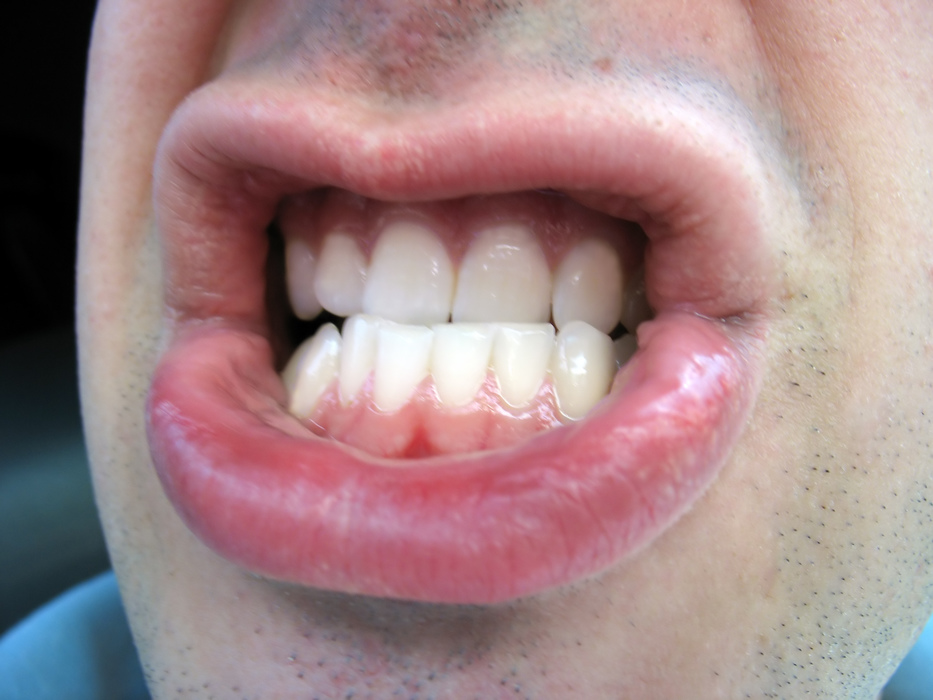Bruxism Is Common
Bruxism is teeth grinding that leads to dental problems. It’s been estimated that 30 to 40 million Americans suffer from the condition.
But you couldn’t possibly be one of them, right? If you were clenching your teeth, you’d know it, wouldn’t you?
Don’t be so sure. One form of bruxism that dentists are often called up to treat is sleep bruxism, in which the patient engages in teeth grinding when he or she is out cold in bed. You don’t know what you’re doing in your sleep.

You might not even be fully conscious of what you’re doing when you’re awake. You may have known someone with a nervous tic that the person not only couldn’t control but didn’t even know that he or she was doing. Waking bruxism can be like that.
You might have bruxism if you have one or more of the following symptoms.
Symptoms of Bruxism
- Teeth that have begun to flatten
- Muscle pain in the jaw area
- Swelling
- A clicking noise upon opening or closing the mouth
Assuming you are experiencing such symptoms, it’s more likely they result from teeth grinding if you have one or more of the bruxism risk factors. If you do, you should tell your dentist when you’re seeing him or her about your symptoms.
Seven Risk Factors for Bruxism
- Family history. Family history is a risk factor for a great many illnesses and health conditions, and bruxism is no exception. If your mother, father, a sister, or a brother had an issue with teeth grinding, you’re more likely to have one too.
- Bite misalignment.It’s conceivable you have a misaligned bite or crooked teeth. If you do, you’re apt to develop temporomandibular joint (TMJ) syndrome and experience pressure or pain on your jaw joints. Researchers believe that when that happens, the pain can manifest itself as spasms, and the spasms can take the form of teeth grinding.
- Poor health habits.Sleep bruxism in particular is more likely if you smoke or drink alcoholic beverages to excess. Even drinking caffeinated beverages to excess is a risk factor.
- Stress and anxiety.You could conceivably have an actual emotional illness that produces high anxiety. That isn’t necessary for anxiety to count as a risk factor, however. If you’re going through a difficult, stressful phase in your life or have a high-stress lifestyle in general, your anxiety makes it more likely you’ll grind your teeth.
- Sleep disorders.If you have sleep apnea, you stop breathing while you’re asleep on multiple occasions through the night. Often the tongue is blocking your airway. Teeth grinding can be the body’s way of clearing the airway and getting you breathing again. Of course, just as it’s difficult to know if you have sleep bruxism, it’s difficult to be sure you have sleep apnea. But if you do, it may well produce one or more of the following symptoms, most of which are apparent when you’re awake: dry throat, low energy, mood changes, depression, forgetfulness, and restless sleep.
- Other medical and mental health problems.Researchers have linked bruxism to Parkinson’s disease, dementia, ADHD, night terrors, gastro esophageal reflux disorder, and epilepsy.
- Medication. A medication prescribed to treat one illness or another may be producing bruxism as a side effect. You’re most likely to experience this if you’re taking an antidepressant or some other psychiatric medication, but those aren’t the only medications that can produce this unwelcome effect.
Today there’s much that can be done in the way of bruxism treatment. Many sufferers find that a bruxism night guard protects their teeth while they sleep. Doctors can change a medication that has an unwanted side effect. Counseling can address anxiety, behavior therapy can help control an unwanted waking behavior, and a sleep specialist can help with sleep apnea.
But effective bruxism treatment begins with the diagnosis, so don’t make the dentist’s task harder in this regard. Don’t be reticent. Even if it’s a little embarrassing, own up to that three-packs-a-day cigarette habit or any of the other risk factors you happen to have.


